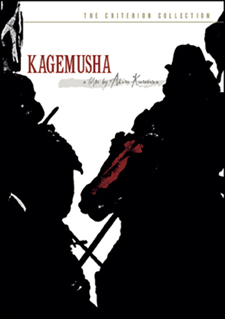FILM-FORWARD.COMReviews of Recent Independent, Foreign, & Documentary Films in Theaters and DVD/Home Video
KAGEMUSHA (1980)
DVD Features:
DISC ONE - Audio Commentary by Stephen Prince, author of The Warrior's Camera:
The Cinema of Akira Kurosawa. Trailers.
New, restored high-definition digital transfer. New & improved English subtitle translation.
With the final installment of Star Wars finally in theatres, perhaps
it is good timing to take a look at Kagemusha by George Lucas' true
"master," Akira Kurosawa.
This 1980 epic film takes place in 16th century Japan during the
Warring States period when three warlords, Shingen
Takeda, Nobunaga Oda and Ieyasu Tokugawa, vigorously fight to unify
the country. In such a time, the Takeda clan inadvertently loses their
leader Shingen (Tatsuya Nakadai) when he is wounded from a sniper shot. Fearing the fate of his leaderless army and state,
Shingen appoints a petty, nameless thief, also played by Nakadai, to
impersonate him before he dies. The film follows the rueful fate of a
simple man in power as he grows from being reluctant to endearingly
loyal to the deceased leader during his three years of impersonation.
This uncut 180-minute version takes not only patience but a genuine
appreciation of Kurosawa's love of sustained tension and slow,
lingering camera work. Yet the DVD restores Kurosawa's signature
shots of vibrant colors set against the Shakespearean psychological
meditation of a ruler. Though the pacing of the film is no Star
Wars, it is
difficult to envision many contemporary cinematic war scenes
without the work of this Japanese auteur.
DVD extras:
The audio commentary by Stephen Prince offers great insight into
Kurosawa's direction, as well as the background of Japanese
culture needed to fully grasp this often opaque historical film. The 43-minute video piece that reconstructs the film
through Kurosawa's sketches and paintings also invites fan to
appreciate Kurosawa the artist, in which his original vision of the
film is depicted in bold, watercolor strokes. There is also a chapter of camp, where Coppola and
Kurosawa give a
comically awkward performance for a Japanese Suntory Whisky commercial
on the set of Kagemusha, à la Bill Murray in Lost in Translation.
But the treasure for Kurosawa fans is definitely the 41-minute
making-of documentary. How everyone from the
leading actor to the horse trainer can recall certain quotes or
sayings by Kurosawa after all these years speak not only of the
director's uncompromised passion, but his continuing influence on the
Japanese film industry. Marie Iida
|